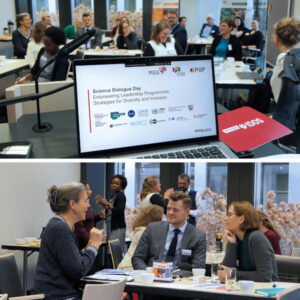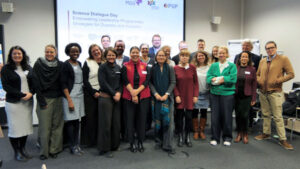The Science Dialogue Day is a new format initated by the Managing Global Governance (MGG) Programme and IDOS to strengthen networks among leadership academies in North Rhine- Westphalia. The first event in this series of networking and dialogue activities focused on strategies for diversity and inclusion.


This workshop took place on 5 December in Bonn and brought together around 25 directors and coordinators of leadership programmes in North Rhine-Westphalia targeting sustainable development and international cooperation. Represented institutions include the Academy of International Affairs, the Charlemange Prize Academy, the Centre for Global Cooperation Research at the Universtiy Duisburg-Essen and leadership programmes targeting African Countries from the University of Cologne, or from the German Academic Exchange Programme. Additionally, different leadership programmes hosted at the United Nations in Bonn, Deutsche Welle Academy and the formats of of IDOS, including the MGG Academy, the Shaping Futures Academy and the Postgraduate Programme (PGP) were present.
The starting point for the exchange was that various research and training institutions in NRW have developed academies and other training programmes for young professionals and (future) leaders in international cooperation on sustainable development. The heads and coordinators of these programmes came together to exchange and engage in joint reflection on successes and challenges as well as to increase peer learning across conceptual, thematic and administrative questions. The workshop provided an interactive and participatory experience that aimed to enhance the understanding and implementation of diversity and inclusion within the programmes.
A particular focus of the first edition of the meeting was put on diverse leadership, a concept understood as being essential for contributing to just and equal societies. To increase diversity, the workshop concluded, it is fundamental that different segments of the population are represented in leadership positions across all sectors (public, private, and social). Ideally, leaders should represent the population as a whole and be aware of privileges, power structures, broader concepts of diversity, equity, and inclusion. Promoting diversity will enable the development of more inclusive and sustainable public policies and initiatives. In this context, the design of training programmes, diverse trainers, and recruitment practices play an important role.
The Science Dialogue Day was organised and facilitated by Tâmara Andrade and Johanna Vogel within the Managing Global Governance (MGG) Programme at IDOS.
Schreibe einen Kommentar